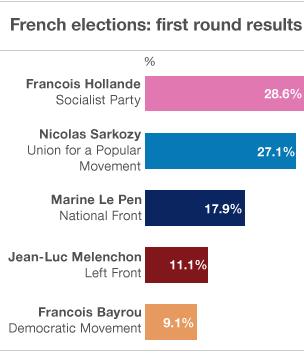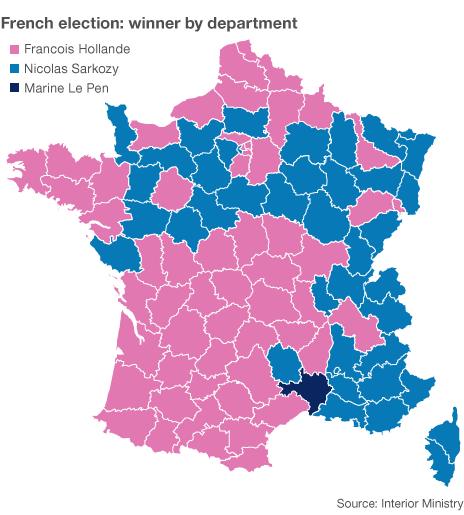France election: Sarkozy seeks key far-right votes
- Published
The French presidential candidates react to the results of the first round of voting
French President Nicolas Sarkozy is wooing far-right voters after losing narrowly to his Socialist rival in the presidential election's first round.
Francois Hollande came top with 28.6% and Mr Sarkozy got 27.1% - the first time a sitting president has lost in the first round.
Third-place Marine Le Pen took the largest share of the vote her far-right National Front has ever won, with 18%.
Referring to her voters, Mr Sarkozy said: "I have heard you."
"There was this crisis vote that doubled from one election to another - an answer must be given to this crisis vote," he said.
In a speech to supporters in Tours, Mr Sarkozy also blamed "a media unleashed" for his first round result.
"We were campaigning against caricatures and lies... and I thank you for your support," he said.
Pollsters say Mr Hollande is the clear favourite to win the second round on 6 May, a duel between him and Mr Sarkozy, who leads the centre-right UMP.
If Mr Hollande wins he will become the first Socialist president in France in 17 years.
Intense campaigning has resumed, with Mr Sarkozy travelling to Tours in the Loire Valley, central France, while Mr Hollande went to the western towns of Quimper and Lorient, in Brittany.
Speaking to around 3,000 rain-drenched supporters in Quimper, one of his strongholds, Mr Hollande described himself as the candidate of change.
He said he wanted to speak to all French people, not just the left or right.
"My message? We are a large country and we will recover - we have no need of divisions," he said.
How many debates?
Marine Le Pen: "I don't believe Nicolas Sarkozy is sincere anymore"
Around one in five people voted for Ms Le Pen, including many young and working class voters, putting her ahead of seven other candidates.
The election has been dominated by economic issues, with voters concerned with sluggish growth and rising unemployment.
Ms Le Pen, who campaigned on a nationalist, anti-immigration platform, said she would wait until May Day next week to give her view on the second round.
She told jubilant supporters that the result was "only the start" and that the party was now "the only opposition" to the Left.
Opinion polls taken after voting on Sunday suggested that between 48% and 60% of Le Pen voters would switch to backing Mr Sarkozy in the second round.
But pollsters also predict a large abstention rate in the second round.
The BBC's Europe editor Gavin Hewitt says the result revealed a dissatisfaction and restlessness in France, creating political volatility. The elites are despised, the economic future is feared and there is insecurity, he says.

Nearly a fifth of voters backed a party - the National Front - that wants to ditch the euro and return to the franc.
Reacting to the Front's success on Monday both the President of the European Commission, Jose Manuel Barroso, and German Chancellor Angela Merkel warned that populist politics was a threat to Europe.
Mrs Merkel said the Front's "alarming" rise would probably be "ironed out" in the second round. She said she would continue to support Mr Sarkozy.
Mr Barroso said the economic crisis had provided "political ground for populism to develop".
Wages, pensions, taxation, and unemployment have been topping the list of French voters' concerns.
Mr Sarkozy - in power since 2007 - said he understood "the anguish felt by the French" in a "fast-moving world".
He called for three debates during the two weeks to the second round - centring on the economy, social issues and international relations.
Mr Hollande promptly rejected the idea. He told reporters that the traditional single debate ahead of the second round was sufficient, and that it should "last as long as necessary".
Far-right shock
Turnout on Sunday was high, at more than 80%.
Ms Le Pen achieved more than the breakthrough score polled in 2002 by her father and predecessor, Jean-Marie Le Pen, who got through to the second round with more than 16%.
Leftist candidate Jean-Luc Melenchon, who was backed by the Communist Party, came fourth with almost 12%.
He urged his supporters unconditionally to rally behind Mr Hollande in the run-off.
Centrist Francois Bayrou, who was hoping to repeat his high 2007 score of 18%, garnered only about 9%.
President Sarkozy has promised to reduce France's large budget deficit and to tax people who leave the country for tax reasons.
Parisians 'surprised' by success of National Front leader Marine Le Pen
Mr Hollande has strongly criticised Mr Sarkozy's economic record.
The Socialist candidate has promised to raise taxes on big corporations and people earning more than 1m euros a year.
He also wants to raise the minimum wage, hire 60,000 more teachers and lower the retirement age from 62 to 60 for some workers.
If elected, Mr Hollande would be France's first left-wing president since Francois Mitterrand, who completed two seven-year terms between 1981 and 1995.
